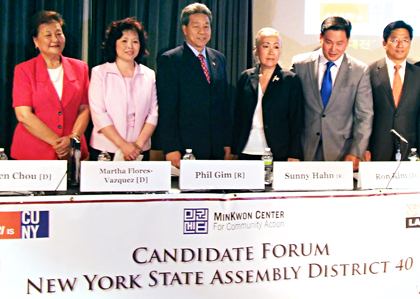


By Zhang Bin (张斌)
Issue 592, Oct 22, 2012
News, cover
Translated by Zhu Na
Original article: [Chinese]
Every Wednesday a group of ethnic Chinese from Flushing in the Queens borough of New York City get together for a meeting of the Beijing Association of New York. But on the Wednesday of Oct 24, something unusual happened when the group met at a Chinese restaurant.
The group was suddenly visited by Chinese-American Phil Gim (任柏年), candidate for the State Assembly seat of New York’s 40th District, which includes Flushing.
He was there canvassing for votes with his wife Lucy, and he had an engaged audience. Chinese-Americans in Flushing seem very interested in State Assembly races. And they care most about whether Chinese-American and current New York State Assemblywoman Grace Meng (孟昭文) can win a seat in the US congress. Compared to these contests, the presidential election is little more than a side-note.
The Sudden Visit
Mr. Hou Jianli (侯建利), founder of the Beijing Association of New York, came to the US in the 1980s for graduate-school before starting his own business.
Phil Gim came at the invitation of Mr. and Mrs. Hou, hoping to capitalize on the couple’s influence in Flushing’s Chinese community. The invitation was extended to the Republican candidate in spite of the fact that the Hous are Democrats.
Flushing is known as “the second-largest Chinatown in New York,” but in fact, it’s home to a multitude of ethnic groups. The Chinese population does make up nearly 60 percent of the population though, making it key to winning the district.
There were originally seven candidates running for the 40th District seat, including five Democrats and two Republicans. The Democrats included two Chinese-Americans - Zhou Yanxia (周燕霞) and Chen Daoying (陈道英), two Korean-Americans and a Hispanic. The Republicans included Chinese-American Phil Gim and a Korean-American.
“With this constituency, getting a candidate with a high nose and blue eyes to compete is basically impossible,” said Mr. Hou.
During the Democratic primary, the two Chinese-American candidates attacked one-another and split the Chinese vote, giving Korean-American Ron Kim the party’s nomination. He’ll now compete against Phil Gim in the general election. So, if Chinese in the district still want to elect a Chinese candidate, then they may have to jump party lines.
The Hous agreed to help Phil Gim after previously supporting Democrat Zhou Yangxia in the primaries. Mrs. Hou had some advice for Gim saying that above all else, he must ensure that his base, or “iron votes” show up on election day.
The president of the Dalian Association of New York, who was sitting at the same table, also suggested putting more effort into publicity. Since the two Chinese Democrats failed, many Chinese in the district didn’t know Gim was running. He also suggested Gim visit the elderly center, subways and other public places to campaign, and advised that “Attitudes must be humble.”
Mr. Gim’s wife Lucy replied immediately saying, “Being humble is a must, and [my husband] is a very humble and polite person.”
While eating Mr. Hou pointed out that there were other people in the restaurant and that they probably live nearby. Mr. Gim got up immediately and went to introduce himself and hand out business cards.
Voting for the Candidate, Not the Party
Those at the restaurant that day were nearly all Democrats or independents, so why did they break rank to support Phil Gim?
“Firstly, in New York it’s very difficult for an ethnic Chinese Republican to run,” Mr. Hou said. “New York is the Democrats’ world, so we should respect him.”
Li Lin (李林), president of the Hunan Association of New York, has no party affiliation. “Now all Chinese should unite together and vote for the person rather than the party,” he said. “Once Phil Gim gets elected, he will bring us benefits. He knows who’s supporting him this time and if he doesn’t perform well, in two years we won’t vote for him again.”
Korean Ron Kim is young and seen as a very strong rival. Just a few days earlier, he had gotten married to a Chinese woman. Several people at the table remarked that he’s also “playing the Chinese card,” otherwise he wouldn’t choose this time to get married.
"In the United States, politics is a deal; a balanced and brute fight," Mr. Hou said.
Candidates are free to change their party affliation after they’re elected, but Lucy dismissed this possibility for her husband. She said Peter Koo (顾雅明), a current New York city council member, ran as a Republican, but since most of his supporters were ethnic-Chinese Democrats, he changed his party after being elected. He received much criticism for the decision. “So we wouldn’t change parties,” Lucy said.
Phil Gim emphasized his flexibility though saying, “I’m responsible only for my own voters.”
Voter Apathy
“Before Chinese people came here, most of them were illegal immigrants,” said Peter Koo, the New York city councilman. “They had language barriers and their cultural and educational backgrounds were also relatively poor. They only focused on earning money and sending it back home. People have gradually realized the ballots in their hands are actually power and interests, but this awareness still isn’t enough. It needs to continue to be strengthened.”
Some Chinese businesspeople in Flushing still think they’re just living in a “gray zone.” They make money, speak English and socialize with Americans, but don’t have a sense of belonging. One person said, “The Chinese who’ve entered the State Assembly or US Congress are just the cloak of America flaunting democracy. Only one or two Chinese people have entered. There’s no real say at all.”
Mr. Hou said this view is wrong. “Since you become a US citizen, you should cherish the vote in your hands, because it may have a profound impact on your next generation or even future generations.”

